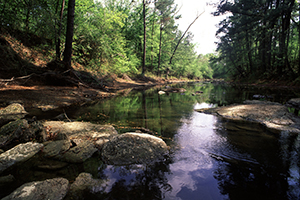Healthy forests
are critically important to protecting water resources and sustaining them in
the future. Approximately 50 percent of the freshwater resources in Texas
originate on forestlands, which provide a continuous and abundant supply of
clean water. In fact, many state and national forests were established to
protect the country’s water sources.
Water
Resources and BMP Publications | | |  |
Forest and Water Relationship
Forests provide a number of essential economic,
social and environmental functions in addition to supplying the cleanest water
of any land use. They absorb rainfall, refill groundwater aquifers, slow and
filter stormwater runoff, mitigate erosion, reduce flooding and maintain
watershed stability and resilience. These watershed ecosystem services provided
by Texas forests are valued at $13.2 billion annually.
Forests
and Water – Helping to Meet the South’s Water Needs Today and Tomorrow (PDF,
5MB)
Future
Challenges
While the
benefits provided by forests are numerous, they are constantly at risk. Texas’
population is expected to nearly double over the next 50 years, resulting in an
overall increase in water demand. Compounding this issue is that growth
generally occurs at the expense of forestlands, which are already under stress
from the effects of drought, wildfire and insect and disease problems, further
impacting water quality and supply. As the current drought has demonstrated,
during extreme periods, Texas does not have enough water to meet the projected
demand. Water availability will be the limiting factor affecting future growth
and prosperity in Texas.
Creative Solutions
Given
the challenges facing water managers in Texas, creative solutions that benefit
the state’s trees and forests, while simultaneously sustaining the region’s
water supplies, are needed. Supporting healthy and sustainable forests, in both
urban and rural areas, is a cornerstone solution to maintain their functionality
and the many benefits, services and products these lands provide.
+ Urban Forests and Water
Trees
and forests within urban and community areas of the state serve numerous
functions, including mitigating flooding potential, managing stormwater runoff
and protecting water quality. TFS is working with municipalities to investigate
how trees can be incorporated into green infrastructure and low impact
development plans. Strategic partnerships are also being developed with water
utilities to identify and implement forest conservation initiatives to protect
source water.
Urbanization
and Water Demands in Texas (PDF, 150KB)
Urban
Forests Protect Water Resources (PDF, 135KB)
+ Rural Forests and Water
Private
land stewardship, through the implementation of
Best Management
Practices, is one of the principle means of protecting water resources. BMPs
are voluntary conservation practices designed to protect soil and water
resources. Treating water at its origin, and not just its destination, is an
efficient, cost-effective and sustainable way to provide water for Texas.
Texas
A&M Forest Service actively works with natural resource professionals,
landowners and contractors across the state to implement BMPs and practice land
stewardship. Special focus is directed to lands impacted by wildfires and other
disasters in order to prevent further site degradation.
Wildfire
Recovery – Protecting Your Property from Soil Erosion (PDF, 286KB)
Short-term
BMPs Following a Wildfire (PDF, 807KB)
Wildfire
Recovery Soil Erosion Control Practice Guide (PDF, 720KB)
+ Contact
Hughes
Simpson
Program Coordinator
200 Technology Way, Suite
1281
College Station, TX 77845
979-458-6630 office
979-458-6633
fax
hsimpson@tfs.tamu.edu
| Todd Thomas
Staff
Forester
P.O. Box 310
Lufkin, TX 75902-0310
936-639-8180
office
936-639-8185 fax
tthomas@tfs.tamu.edu |
Donna
Work
Biologist
P.O. Box 310
Lufkin, TX 75902-0310
936-639-8191 office
936-639-8185 fax
dwork@tfs.tamu.edu
| Lori Hazel
Staff Forester
101 South Main Street
Temple, TX 76501
254-742-9874 office
lhazel@tfs.tamu.edu |
Hannah
Cruce
Staff Forester
2040 North Loop West, Ste. 380
Houston, TX 77018
713-688-1248 office
713-688-8947 fax
hcruce@tfs.tamu.edu | Jeff McFall
Staff Forester
15110 Jones Maltsberger, Suite 103
San Antonio, Texas 78247
(210) 213-9876 office
jmcfall@tfs.tamu.edu |